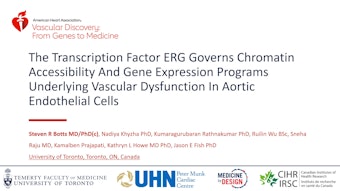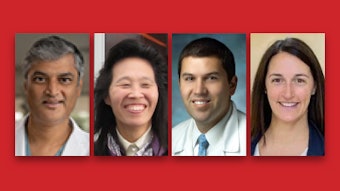Tiffany M. Powell-Wiley, MD, MPH Awarded AHA’s 2021 Population Research Prize

Tiffany M. Powell-Wiley, MD, MPH, of the National Heart, Lung, and Blood Institute was awarded the 2021 Population Research Prize.
The Population Research Prize recognizes an individual who is making outstanding contributions to the advancement of cardiovascular science and who currently leads an exceptional laboratory focused on cardiovascular population research.
Dr. Powell-Wiley was selected as this year’s Population Research Prize because of her ongoing work to improve understanding of the social determinants of obesity and cardiovascular disease, which is the focus of her laboratory and research group. She is currently leading three multiyear clinical trials aimed at better understanding the determinants of health in at-risk communities in Washington, DC.
Dr. Powell-Wiley is a Stadtman Investigator and chief of the Social Determinants of Obesity and Cardiovascular Risk Laboratory in the Cardiovascular Branch of the Division of Intramural Research at the National Heart, Lung, and Blood Institute at the National Institutes of Health in Bethesda, Maryland. She is an adjunct investigator in the Intramural Research Program at the National Institute on Minority Health and Health Disparities, and she is a staff cardiologist at the National Institutes of Health Clinical Center.
Her research is focused on developing cardiovascular interventions that can be tailored to meet community needs and ultimately improve health outcomes among high-risk populations. She is leading the development of multidisciplinary, community-based cardiovascular health behavior interventions. Her three current clinical trials are: A Geospatial Analysis of Neighborhood Environmental Stress in Relation to Biological Markers of Cardiovascular Health and Health Behaviors in Women; Tailoring Mobile Health Technology to Reduce Obesity and Improve Cardiovascular Health in Resource-Limited Neighborhood Environments; and A Cardiovascular Health and Needs Assessment in Washington, DC. The DC Cardiovascular Health and Obesity Collaborative, the partnering community advisory board that collaborates in the design and implementation of Dr. Powell-Wiley’s studies, serves as a venue for community and academic leaders throughout the DC metropolitan area to identify targets and tools for improving cardiovascular health for the populations they serve. Dr. Powell-Wiley’s laboratory, which centers community engagement in its research approach, is a first-of-its-kind in the National Heart, Lung, and Blood Institute Intramural Program.
“I am extremely honored to be the 2021 recipient of the AHA’s Population Research Prize,” said Dr. Powell-Wiley. “I was fortunate enough to be introduced to AHA’s Scientific Sessions as a medical student doing research at the National Institutes of Health, and I have been a committed member of AHA for most of my medical career. Being a part of AHA opened my eyes to the possibilities of population science in cardiology and the myriad ways that I could combine my interests in epidemiology with community-based participatory research to investigate the role of social determinants of health in cardiovascular outcomes and to identify interventions that may mitigate the biological effects of adverse social conditions.”
Her work uses community-based participatory research to improve our understanding of the social determinants of obesity and other conditions that adversely impact cardiovascular health. She has been recognized through National Heart, Lung, and Blood Institute Director’s awards for her mentorship of research fellows and for promoting diversity in her work. She has authored more than 90 published articles for peer-reviewed medical and social science journals.
She earned her medical degree from Duke University School of Medicine and a master’s in public health from the University of North Carolina Gillings School of Global Public Health. She completed her residency at Brigham and Women’s Hospital in Boston and her fellowship in cardiology at the University of Texas Southwestern Medical Center in Dallas. In 2013, she was recognized by the association as the Greater Washington Region Bronze Ambassador.
“In my career, I am thankful that I have been able to collaborate with and learn from partners who are advocating to improve cardiovascular health in their communities and providing voice for those who have been marginalized in the health care system,” said Dr. Powell-Wiley. “I am also grateful for guidance and inspiration from all of my mentors and role models both in times of success and turmoil through my academic training and as a physician-scientist at the National Institutes of Health. My laboratory’s interdisciplinary work requires fruitful collaborations, but most of all, it happens because of the dedication and unyielding efforts of current and former team members. There have been many days that I was inspired to keep moving a project forward by the excitement conveyed by a research fellow or team member about the work they were doing. Finally, my career as a population scientist would not be possible without the support and encouragement from my family, especially my husband Dr. Kenneth L. Wiley Jr.”











